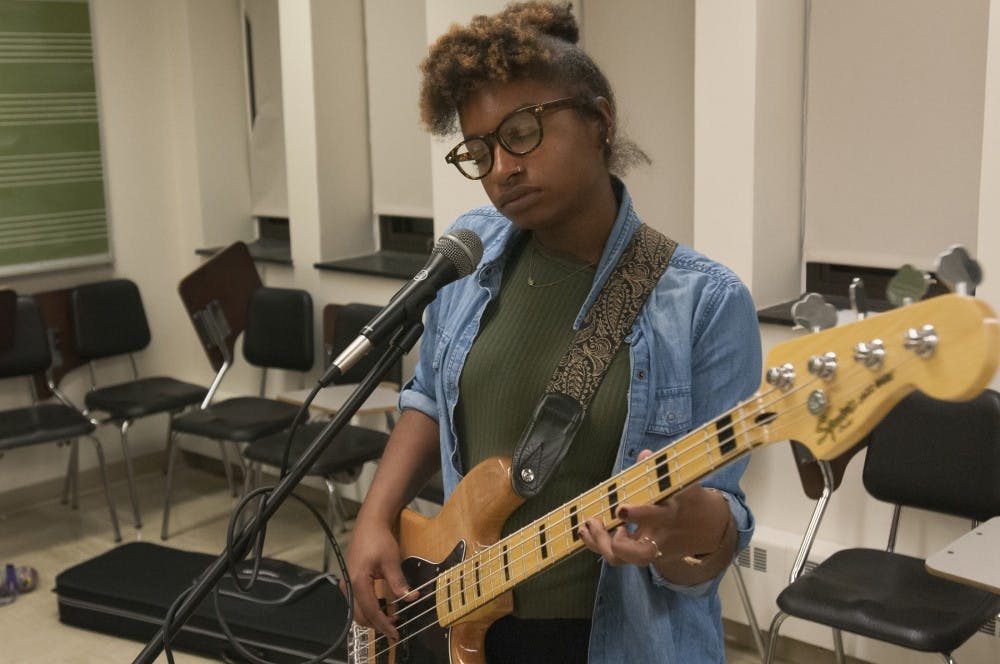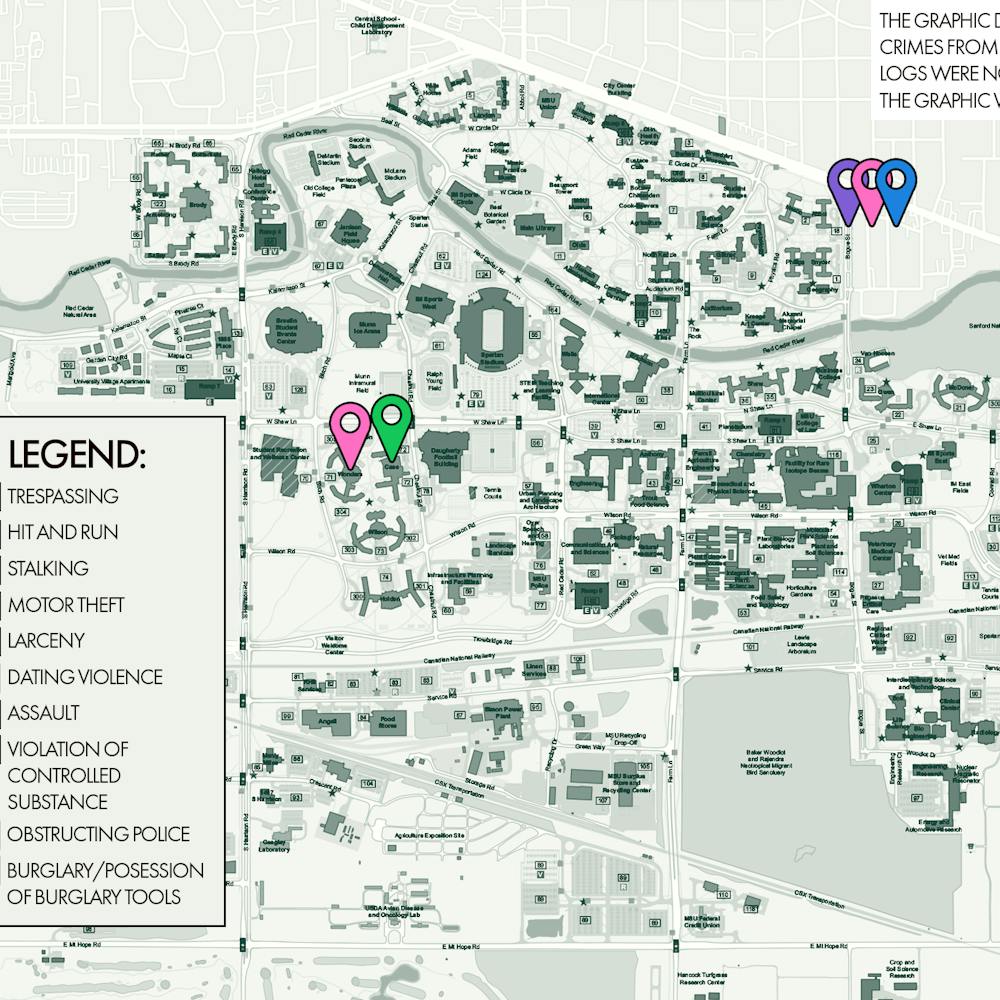Music has the ability to influence people in many ways, whether it’s their mood or their mindset.
For jazz studies senior Jordyn Davis, music influenced her to change her major.
Davis was originally an environmental engineering and geology major before switching to jazz studies — a four-year program that will require Davis to attend MSU for potentially another two and a half years.
“At the end of the day, it’s totally going to be worth it because I’m finally doing what I want to do and learning what I need to be learning from the field that I want to go into,” Davis said.
Going into the music field helps Davis deal with a day-to-day issue for her — anxiety.
Davis has been dealing with anxiety ever since she was a child, and because of this, she danced competitively for 10 years, participated in the marching band, was on the swim team and was a leader for several organizations in order to deal with her anxiety, Davis said via email.
However, Davis said while she never knew how to identify with her anxiety, she always knew how to deal with it.
“I naturally just had these feelings and didn’t really know what they meant,” Davis said. “I just generally felt really uncomfortable and stressed and tense all the time.”
Davis said she had difficulty explaining to people how she didn’t want to interact with them and why she couldn’t have a natural interaction with others.
But Davis said she now has a better understanding of what anxiety is in her life, after being diagnosed with anxiety three to four years ago.
“It’s a lot easier to manage things and a lot easier to explain that to people and to go about my daily life and understand there’s nothing wrong with me,” Davis said. “This is how I process what’s going on in the world and this is how it makes me feel.”
This led Davis to music, which helps her cope with her daily struggles of anxiety.
“I’m able to step into this realm or this new world of whatever story or whatever journey I want to be taken on through this type of music,” Davis said. “That really helps take my mind off of my feelings of anxiety and my feelings of discomfort and let go and embrace whatever the music has to offer.”
Davis said this led her to falling in love with the bass, since in music, it’s the foundation of a song. The warm and boomy sound — as she describes the instrument — is what Davis said brought her to choose the bass over other instruments.
“Without a bass player, it’s really hard to tie a whole tune together,” Davis said. “Without the bass in the middle to tie it all together ... it’s like a dual functioning instrument — like rhythm and harmony — which you don’t really get with many other instruments.”
Davis said she’s wanted to be a part of the music industry for some time, dating back to a when she was 4-years-old.
Davis said she often thinks of a picture of her as a child with a toy microphone and how it embodied her love of music.
“As a child, I always had a natural love for music,” Davis said. “I always had a CD player, was always plugged in listening to music, dancing and enjoying what it is.”
This love of music transitioned into middle school as Davis wanted to further her musical palette by choosing to play the bass over other options such as the violin and cello, Davis said.
“I was like, ‘I want to play that thing (bass), it’s really big, nobody wants to play it, nobody understands it, so I’m going to figure it out and tackle that challenge and go for it,’” Davis said.
Davis said her love for music has evolved into different spectrums within music, starting off with classical music and eventually being exposed to rock and alternative music throughout high school.
This helped Davis to better understand jazz music, which Davis said is a different conundrum compared to other music such as classical, especially being a bass player.
“Bass in jazz is such an important part, you don’t have jazz without a bass player,” Davis said. “It just doesn’t work that way.”
Davis said the theory, concept and how musicians approach a tune in jazz is completely different. They have to come up with everything off the top of their head, where as in classical music, everything is already assembled for them.
“You get a chart or piece of music and literally every bar has a key or a chord change, that the bar is going to be in. ... You just write your bass line based off that one key,” Davis said. “It’s all of the elements brought into one piece that you are figuring out how to make it cool in 10 seconds ... but it also has to be swinging.”
This led Davis to start the project Composetheway, and with it, an extended play, EP, titled “Connections,” which is scheduled to be released in February.
“It’s about encouraging people to live for themselves, while empowering each other and empowering yourself,” Davis said. “It’s got a really positive message to it, but a lot of my music also emphasizes the reality of situations that we live in or situations that we deal with in society.”
Davis said with Composetheway and “Connections” she’s trying to get out of her comfort zone as a writer and composer and perform her music.
“I’ve been hiding behind these songs for a couple of years and now (I) want to get them out there,” Davis said. “It’s something I’ve been pushing myself to do more of.”
Davis said all of her songs in “Connections” are based off of the situations or relationships that herself or other people have had to deal with when trying to understand general interactions with other people.
Davis said she’s grateful for the band she put together for “Connections,” which consists of her colleagues of her’s in the College of Music.
“They’re helping me bring it to life,” Davis said.
One of those musicians is jazz studies freshman and drummer Will Crandell.
Crandell said he and Davis have a lot of the same classes, and she invited him to do a performance at the Eli and Edythe Broad Art Museum.
From there, Crandell said Davis told him about joining her in recording. Crandell said he was definitely on board since he likes her type of music and what inspires her to write music.
“It’s jazz-oriented, but also you can hear a lot of neosoul, R&B and indie folk,” Crandell said. “It’s really cool to mix those flavors musically ... It’s a cool vibe.”
Anthropology junior Breanna Escamilla — a friend of Davis — said seeing Davis develop Composetheway is inspiring.
“To see someone completely change what they’re doing with their education ... I think it’s really empowering thing to her individually and people around her,” Escamilla said.
Escamilla said from listening to Davis’ music, she can tell her music is a reflection of her.
“I think that’s a very hard process and a very hard thing to do for a lot of people, especially when it comes to the arts,” Escamilla said. “To be able to draw, paint or write yourself into your final thesis and not override or saturate your work to where it’s not approachable to other people, I think Jordyn does that very well.”
Crandell said Davis gave all the musicians freedom to interpret the music in the way they felt the music should be perceived.
“She allowed us a lot of freedom to make our own musical decisions,” Crandell said.
Davis said she’s been trying to work out this project all by herself for the past couple of years, and the help her band now provides is instrumental in getting “Connections” off the ground.
“The past couple of years it’s just been me trying to figure this stuff out on my own,” Davis said. “It’s been an honor to work with them.”







